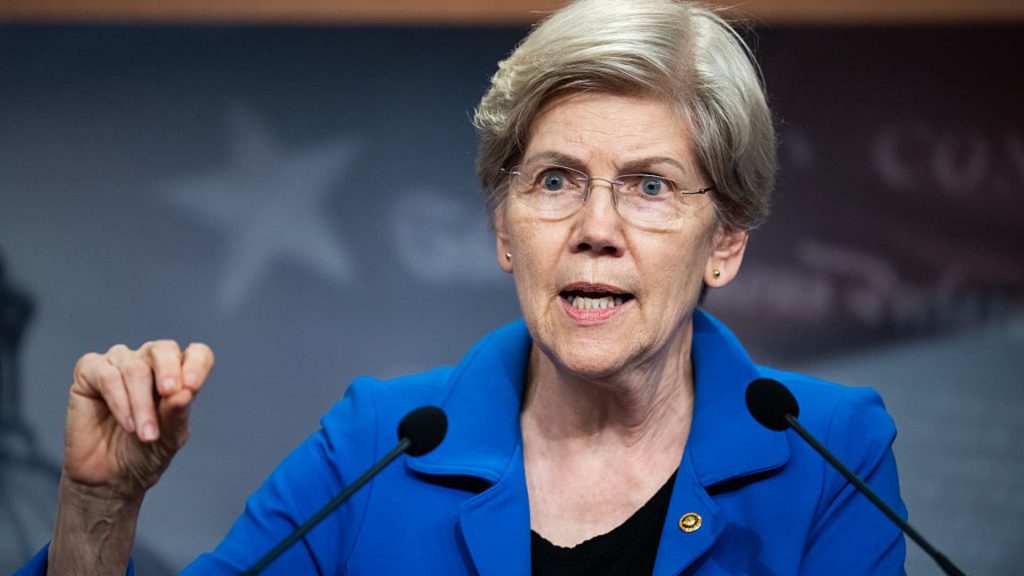On Tuesday, two prominent Democratic lawmakers directed their inquiries toward five of the largest pharmaceutical companies in the United States, questioning the minimal taxes these firms have paid and their stance regarding the continuation of substantial tax cuts as part of the GOP reconciliation bill.
Senator Elizabeth Warren (D-Mass.) and Representative Jan Schakowsky (D-Ill.) accused Pfizer, Merck, Johnson & Johnson, AbbVie, and Amgen for paying little to no federal taxes on profits made in 2024 and previous years, despite each company reaping tens of billions in revenue from their pharmaceutical products.
In individual letters sent to each corporation, the lawmakers contended that these pharmaceutical giants have evaded U.S. tax obligations by relocating their profits to offshore subsidiaries in countries with significantly lower tax rates, including Ireland and Bermuda. This tax avoidance tactic has been facilitated by a provision in President Donald Trump’s 2017 Tax Cuts and Jobs Act, which was intended to reduce corporate tax evasion but inadvertently incentivized U.S. multinational companies to shift profits and operations abroad.
Warren and Schakowsky highlighted that this practice exemplifies “just one of the ways in which our tax code has been skewed to benefit wealthy pharmaceutical corporations, enabling them to profit off Americans, charging them the highest drug prices in the world, without paying their fair share of taxes.”
The lawmakers also questioned whether the significant lobbying expenses incurred by these drugmakers were directed towards preserving the tax loophole included in Trump’s “One Big Beautiful Bill Act,” which the Republican-controlled House passed in late May. For instance, Johnson & Johnson reportedly spent over $150,000 on international tax lobbying in the fourth quarter of 2024, as referenced in the correspondence to the company, which cites OpenSecrets data.
If the multitrillion-dollar tax and spending proposal is enacted in its current form, many provisions established by Trump’s 2017 tax act would become permanent. This iteration of the bill also incorporates significant spending reductions to programs aiding low-income Americans, including cuts to Medicaid coverage.
As the bill advances to the Senate, where Republicans have the majority, they may choose to alter or omit several provisions championed by hardline House Republicans who advocate for spending reductions alongside tax cuts. However, removing the offshore tax loophole is likely to face challenges, given the current political dynamics.
Despite these hurdles, Democrats have sought to galvanize public opposition against certain aspects of the legislation while Republicans navigate their own intra-party conflicts to achieve passage. Over the years, both parties have scrutinized the pharmaceutical industry.
Warren emphasized the implications of further tax advantages for these corporations, stating, “It’d be a slap in the face for Congress to expand tax loopholes for Big Pharma companies that are making billions in profit while overcharging Americans. These companies need to be held accountable for prioritizing their profits over people.”
The communications sent to the pharmaceutical companies referenced a March analysis conducted by the Council on Foreign Relations, which proposed that reforming the offshore tax loophole could generate at least $100 billion over the next decade.
The letters also requested details regarding each company’s lobbying efforts aimed at extending the tax incentives and their projected federal tax liabilities. The lawmakers have set a deadline for responses from the companies by July 1.
Spokespersons for Pfizer, Merck, Johnson & Johnson, AbbVie, and Amgen had not provided comments on the correspondence at the time of this report.
This is not the first instance of lawmakers examining pharmaceutical companies regarding their tax-related practices. A previous report from March claimed that Pfizer was involved in what Democratic Senator Ron Wyden labeled “the largest tax-dodging scheme” in the pharmaceutical industry, alleging the company utilized a strategy known as “round-tripping” to avoid U.S. income tax on $20 billion in domestic drug sales in 2019.
Investigative findings from Democratic staff of the Senate Finance Committee indicated that Pfizer had funneled profits through offshore subsidiaries in tax havens like Ireland and Puerto Rico, even as it sold to U.S. customers. Nevertheless, Pfizer argued that it had paid $12.8 billion in U.S. taxes over a four-year span and has corresponding documentation submitted to the Securities and Exchange Commission.
The letters communicated on Tuesday arrive as the Trump administration is contemplating the imposition of tariffs on pharmaceuticals imported into the U.S. with the aim of promoting domestic manufacturing. Trump has voiced concerns that Ireland has successfully attracted pharmaceutical firms to establish manufacturing bases there by offering low tax rates.


























